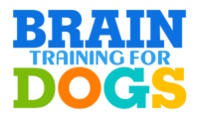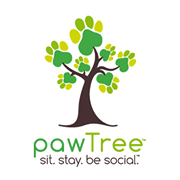Here at Royal Frenchel, the most important part of dog training is the attitudinal context that you are coming from with your dogs. The key is having the attitude that you are connecting with a beloved friend who is an endlessly valuable person that you will learn more about every day. This is a great start to a great relationship!
While dogs have been a part of humans lives for centuries, our understanding about dogs and what it takes to be in healthy relationships with them is constantly evolving.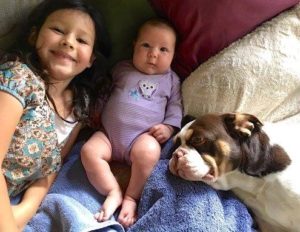
We have brought dogs into our homes and made them part of our most intimate families, but we still relate to them at times in archaic ways that treat them like things rather than beloved friends.
When we act in this manner we miss the needs of our animals and they end up anxious, mistrustful and eventually disobedient.
It is so easy to have a natural and intuitive relationship with your dog that is fulfilling and free from struggle! It just takes getting to know them as an individual personality, someone that is so unique that no one could ever pass for them!
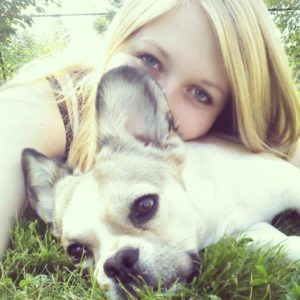 5 Minute Hands-On Play is a short exercise that is extremely effective to do with your dog. And it’s fun too! If you have a Royal Frenchel, you have received the training from me, Anahata Graceland known as ‘Windy’ and if not, you can get it here by just clicking 5 Minute Hands-On Play!
5 Minute Hands-On Play is a short exercise that is extremely effective to do with your dog. And it’s fun too! If you have a Royal Frenchel, you have received the training from me, Anahata Graceland known as ‘Windy’ and if not, you can get it here by just clicking 5 Minute Hands-On Play!
The key first and foremost is to connect to your animal through your heart, in a soul to soul manner. Sound a bit out there, just ask someone you love if they would want you to do that with them. No one ever says no. This is the most important thing that you can do. It feels good and it’s easy.
You simply focus on a mind of inquiry and hold an interest in knowing who your dog is. You look to know your dog in detail. Learn about him or her.
Ask your dog questions, just hold some silence afterward and really rest in the sea of space there that holds the answer. You won’t hear the answer of course necessarily, however, over time you will simply begin to gain a sweet closeness and a knowing that will replace the rote expressions you may have once had otherwise. Instead, you will feel a deep love and affinity for your four-legged friend in a new way and begin to simply “know” things about your dog.
You see your brain can function far more than you think and so can a dog’s. When you focus like I am describing, you open yourself to potentials of gaining insight that unfolds naturally creating a bond of respect and love that flows both ways. Intuitive connection increases and confidence and wellbeing swell.
Once you have established that foundation in your relationship, there are simple laws to follow that will make all training easy and fun. So read on to learn the daily steps to take to cultivate a great relationship with your Royal canine friend!
Human-Canine Laws
First Things First – A Person’s Responsibility to their Dog
Because we have bred dogs for our enjoyment and brought them into our environments, I always consider that the first responsibility of a healthy human/canine relationship falls to us, humans. Therefore, I follow three laws every day in order to create balance and wellbeing in my relationship with my dog.
Law #1 – Witness
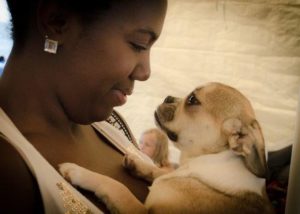 Witnessing your dog means really seeing your dog by connecting with it from an interest in who it is, and again, from your heart.
Witnessing your dog means really seeing your dog by connecting with it from an interest in who it is, and again, from your heart.
Every day make sure to look in your dog’s eyes and see the individual that he or she is. Notice, observe… gain a sense of inquiry into the depth of who they are. Make it fun getting to know something more about him or her each day.
As you relate to your dog as the individual that he or she is, you will begin to learn the subtle details about his behavior and what he or she needs to be happy and in balance.
Law #2 – Consistent Physical Care
All of your dog’s physical needs must be consistently met. These include food, water, rest, outdoor time, cleaning, etc. Rhythm and timeliness are important here! Just like children (adults too), dogs need to be fed, let out, and put to bed at regular times. Fulfilling these needs of your dog will enable it to relax and become a trusting companion.
You know the type of person that everyone loves, the old guy up the street perhaps who always can be counted on, that is around when you need to talk and always has a buck you could borrow? Perhaps it was a grandparent for you. Whoever it is, they are usually slow moving and constant. This is a way of life worth entering with your dog.
Law #3 – Attentive Interaction
You need to have wholesome, interactive time with your animal every day where your focus is totally on your dog. It might be play time, cuddle time, or something else. Make it nourishing and specific to your dog. Look in your dog’s eyes and engage them in what they love.
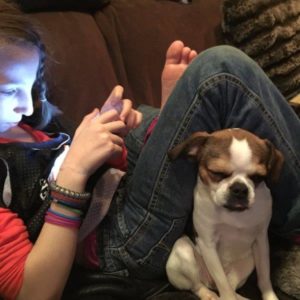 If you have a pack of dogs, each individual dog requires this time from you. Make sure to give your dog at least 10 minutes of this focused attention every day and ensure the time is canine specific, where your attention is with your dog and about your dog, not your dog waiting at your feet while you give it an occasional touch as you read your emails!
If you have a pack of dogs, each individual dog requires this time from you. Make sure to give your dog at least 10 minutes of this focused attention every day and ensure the time is canine specific, where your attention is with your dog and about your dog, not your dog waiting at your feet while you give it an occasional touch as you read your emails!
You will, of course, have time with your dog where you are doing a human-specific activity like your emails, gardening or cooking. This is lovely as you will be sharing energy with your animal. But it is not canine specific. You are not focused on them in the same way and it cannot be a replacement for canine specific time.
Now, here is a very important and wonderful thing about dogs: giving your dog 10 minutes of canine-specific interactive time each day will usually be enough time to keep your pup in balance (given that you are doing your other Laws). You may do more of course, but at least 10 minutes will work.
Dogs are inherently happy creatures. They love the interaction of every day. Just because day breaks they are happy! It is important to meet the animals in that joy. When you give them 10 minutes of canine-specific time every day then they get the nourishment they need. And they will stay in their naturally content state, assimilating the other activities in their day as positive interactions! You generate essentially a positive feedback loop in your dog’ s experience. And you get to inherit the same joyful step!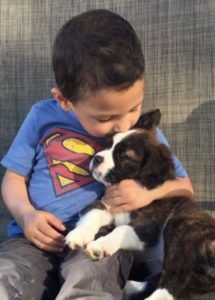
These are a very important set of rules. They set the stage for all the interactions I have with my dogs. Also, and this is super important to remember, these rules govern my rights to correct any unwanted behavior in my animal.
If I have been absent and have an animal that has been acting up I cannot just come in and start correcting. I first have to establish the witness up front, get close and notice what is going on.
I give at least 15 inputs of good care with a dog before I correct unwanted behavior. No, I don’t count the interactions, I simply overwhelm myself with a sense of the dogs goodness, recognizing all the great things about him or her and interact from there. Once you are in the habit, it will astound you how well this works.
These inputs include actions like calling the dog and giving her a piece of meat or petting her as you say something to her while saying thank you for listening.
This establishes me as a worthwhile person in the dog’s life and we gain respect in our relationship. As a result, when I do correct, my results with my dogs are much more effective than people who do not practice all three laws with their animals.
The difficulty that many people have and you can often see this in kennels, is that they treat the animals like cargo and only follow a written routine. They simply do Law #2 with dogs. But dogs will not respond to people who treat them in that manner because the relationship is missing.
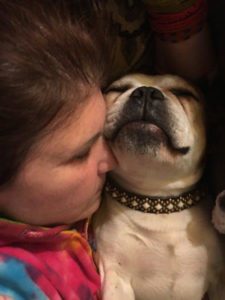 An example is how I Clean Bongo. We used to have a dog in our kennel named Bongo who requires cleaning twice a day before coming into the house due to a screwy quirk in his tail. When I clean him, I use warm water, I look into his eyes and I talk to him about what’s going on. Our interaction is specific to and caring for him.
An example is how I Clean Bongo. We used to have a dog in our kennel named Bongo who requires cleaning twice a day before coming into the house due to a screwy quirk in his tail. When I clean him, I use warm water, I look into his eyes and I talk to him about what’s going on. Our interaction is specific to and caring for him.
As a result, he will actually come to me when it’s cleaning time, anticipating it and excited for our daily ritual together. The washing ends up being an input of favorable interaction between us that I can use as an interaction to expand on our relationship.
If instead, you wash him without your mind on him, just to get him cleaned, you could easily send him the wrong message that is hurtful. You would have only practiced Law #2 and left out 1 and 3. It would be a negative input in his relationship with you and he would begin to mistrust you and become less likely to respond to you.
The dog would then gravitate and respond to the people who have established real leadership with them, those who practice all 3 laws.
Dogs know inherently who the pack leaders are because of these behaviors: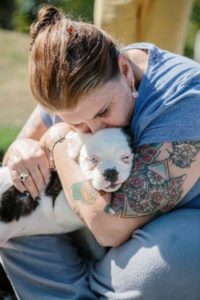
- Pack leaders are dogs that command respect with their eye contact, muscle tone and behavior.
- They don’t abuse power or mistreat the pack.
- They are consistent and know every individual recognizing them for their important role in the pack.
These pack leaders are often quiet and watch. Obvious dominators never are pack leaders.
When we practice all three laws then we embody the stance of a worthy pack leader and our dogs will naturally respond to us. This unleashes our human and the dog’s genetics to add greater capacities in communication and servitude. Together both human and canine find greater intuitive knowing in the relationship and natural joy.
As you practice the laws named above, you will become better and better at actually meeting the needs of your dog and your own needs with that dog. What happens at that point in the relationship is the positive feedback loop that I mentioned above.
Because you have met the needs of your dog, he or she will immediately start to respond to you. They will not be concerned about trusting you anymore and can let loose their nature as a dog to actually participate with you more fully. Dogs, especially Royal Frenchel Bulldogs, are pack oriented and love to please.
Intuition with your Dog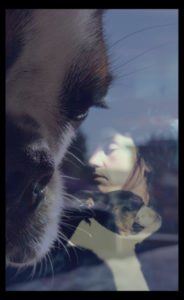
As you work these three laws, you will develop an intuitive capacity to know things about your animal. This is not an odd thing. In fact, it is merely a result of you being attentive to your animal and taking in more information.
You start to take in hundreds of small little muscle, facial and eye movements that your dog is making, or how it is relating to its surroundings. But you can’t identify all those tiny inputs individually with your intellect.
You end up processing that information intuitively. So you want to notice as much as possible. Your intellect will act as the information gatherer and your intuitive self will assimilate the information for you into palatable bites.
You will start to have intuitive awareness about your dog that will most likely come in one of three ways:
1) Visual Experiences
You may start seeing scenes in your mind of your dog’s life that give you information about his or her experiences that you would not otherwise have. For instance, you may be away from her but see in your mind who is feeding her or which dogs she is playing with. You may suddenly sense that it has eaten candy while visiting a friend! It is fun and exciting when these events begin to occur.
2) Auditory Experiences
Such as hearing your dog in your mind when you are out shopping or out of town. For example, you might be shopping and hear your dog barking in your mind and learn later that there was an intruder in your home.
When I am away from my kennel, I know when my dogs are barking in the yard. I often call home and ask those working in the kennel to put the dogs in. It is especially fun when I am training someone new and they experience this for the first time. I become someone special overnight to them too!
3) Gut Experiences
Where you know instinctively what needs to be done for your dog’s good care such as just having a feeling that you need to change his brand of food because you get a sense their tummy hurts or that he or she may need to go outside to the bathroom. These intuitive experiences become another method of communication between you and your dog.
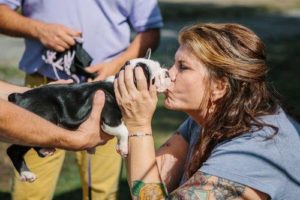 Remember they are natural occurrences that happen once you institute the three laws we outlined. When you focus on seeing your dog’s individuality, noticing what’s happening in his environment and responding to what you notice with care, you simply take in a good deal more information about your dog.
Remember they are natural occurrences that happen once you institute the three laws we outlined. When you focus on seeing your dog’s individuality, noticing what’s happening in his environment and responding to what you notice with care, you simply take in a good deal more information about your dog.
You become a more aware and compassionate friend to your dog and this enables you to receive much more of the input that he or she is giving you. Again this increases trustworthiness and your dog responds even more in the direction you are desiring.
If you are interested in this topic further, drop me a note and I will keep you on my mailing list as we do a training series on how to increase and use your intuition with your canine.
A Dog’s Responsibility to Their Person
Once my part of the relationship is in balance and I am meeting the needs of my dogs, I expect certain things from them. For instance, they know where to go to the bathroom and if they don’t do that they are in “trouble”. Even if it’s three days later that I find a mess, they are in trouble because they know better when our relationship is well established.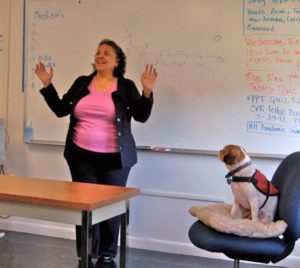
It is remarkable how easy it is for me to housebreak animals because I have established relationships with them. So, I am not really housebreaking them. It’s more like: “Hey we are in a relationship here. Our worlds don’t work if there are poop and pee all over the place. It’s gross!”
Every dog has its genetic line, its natural attributes, and needs. Part of Law #1, witnessing the dog, is witnessing those attributes that are God-given and unique to your dog.
For instance, I have a dog named Bella who is a working dog. If she doesn’t have jobs to do, she is apt to get out of balance, snippy, not eat or rest and start causing problems in the pack. But because I follow my three laws, I am aware of what she needs. She is then relaxed, healthy and easy to train.
Now, if my treatment of Bella is in balance and she greets someone with hair up or a growl, then she gets in trouble from me. What that means is:
- I first get close to her and verbally correct
- I will nip her neck lightly with my fingers (imitating a corrective bite from a fellow canine) and say “Absolutely not”
- Then I immediately distract her with play or another activity
If she misbehaves a second time she gets spoken to in a tougher tone with a slightly stronger nip, and then she gets ignored. She gets ostracized in some way like not being allowed to go close to another animal or not getting food.
This helps her understand that her behavior is not working. I will do that for 5-20min and then it’s done. It is a rare instance, almost never, that a third time is needed when this sort of relationship is fully formed.
Some people think that a dog has a very short memory. Years ago there was an article that suggested that dogs have a 7-second memory, so correct only within that band of time! But that is not the case if you are in a relationship with them.
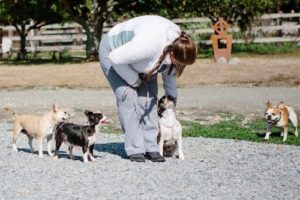 I do agree that correcting right away is ideal as it is with any of us. But dogs are so intelligent and if you have established the relationship in an intricate manner, they become extremely responsive to you and attuned to your commands. Anyone who has been a good friend to a dog knows that its memory is long, perhaps lifelong.
I do agree that correcting right away is ideal as it is with any of us. But dogs are so intelligent and if you have established the relationship in an intricate manner, they become extremely responsive to you and attuned to your commands. Anyone who has been a good friend to a dog knows that its memory is long, perhaps lifelong.
Basic Dog Law: Do What is Needed for the Health and Balance of the Pack (which includes the combo of human and dog in the pack.)
Most of the time dogs will naturally do what is needed for health and balance in their pack, the canine, and human combo. However, I still call it the dog’s law. That is due to the fact that it is not optional for them, it is mandatory in my house.
When your dog understands that there is something needed for their pack’s well-being, they need to perform that need. In my pack that means:
- No pooping or peeing in the house
- No fighting around food
- No bullying between dogs or toward humans
- No harassment barking. However, they are certainly allowed to talk and request things in a conversational way like; “let me out” or “I need more water in my water bowl”.
- Come when you are called (insures safety)
All of these rules maintain the well-being of the pack and result in very happy dogs and people.
In any relationship, we are in a constant conversation with one another whether we are aware of it or not! Connect with the conversation that you are in with your dog and you will open yourself to worlds of information!
Make things fun and respectful by remembering that you are interacting with another soul/person/individual whatever word works for you to remember your dog’s value and potential as an individual. Keep the context of interrelationship, where you are awake to your dog’s unique nature, needs and intelligence.
If you keep this context and practice the three laws for dog lovers that we outlined and hold your dogs to their laws, your relationship will have significant depth, ease, and love!



